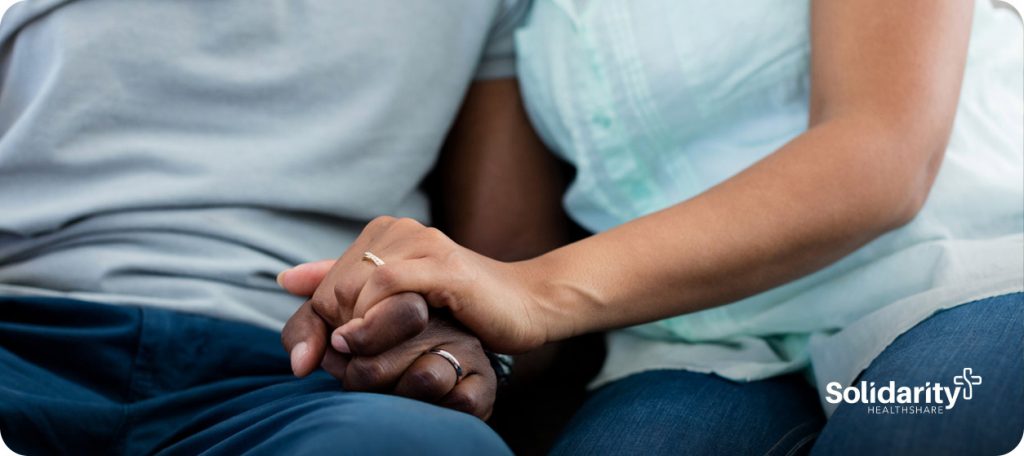As we observe World Mental Health Day on October 10th, I want to raise awareness about the significance of mental health and the importance it plays in our lives. At Solidarity, we prioritize the mental well-being of our members by sharing unlimited counseling visits to support each other through life’s struggles. Today, I am shining a light on a silent and often overlooked mental health pandemic affecting both men and women across our country: pornography addiction.
The Growing Issue of Pornography Addiction
Pornography isn’t just a men’s issue. With the advent of the internet and unlimited easy access, it has evolved into a widespread problem for both men and women, and has become a public mental health crisis. Just take a look at the stats below adapted from an article published by the American College of Pediatricians to understand the alarming reach of pornography today:
- A 2022 survey of teens and pornography reported that 54% of teens had seen pornography by the time they were 13 years old and 15% prior to 11 years old.
- Of males 18-30 years old, 79% viewed pornography once per month and 63% viewed pornography greater than once per week. (2014 Barna Group survey)
- Among females 18-30 years old, 34% viewed pornography once per month and 19% viewed pornography more than once per week. (2014 Barna Group survey)
- In 2019, the cyber security firm Webroot stated that 35% of all digital downloads were related to pornography.
- A report from 2023 revealed the adult entertainment industry profited $13 billion annually in the US and $100 billion globally, exploiting the vulnerability of individuals.
- In 2018, a survey of teens reported that 27% of them had received texts with pornographic material.
Sadly, even Christian communities are not immune to the problem. Covenant Eyes highlights research that indicates that:
- “1 in 5 youth pastors and 1 in 7 senior pastors use porn on a regular basis and are currently struggling. That’s more than 50,000 U.S. church leaders.
- 43% of senior pastors and youth pastors say they have struggled with pornography in the past.
- 64% of Christian men and 15% of Christian women say they watch porn at least once a month.”
The Harmful Impact of Pornography on Relationships
Not only does pornography addiction severely damage individuals spiritually and personally, but it also negatively impacts their relationships and society. Review these statistics adapted from “Pornography Statistics” (Catholic Diocese of Arlington):
- According to the American Academy of Matrimonial Lawyers, 56% of divorce cases involve one party having an “obsessive interest in pornographic websites.”
- Teen exposure to pornography leads to an exaggerated perception of sexual activity in society, diminished trust in relationships, belief that sexual monogamy is unrealistic and unnatural, and cynicism about love and affection in relationships (Journal of Adolescent Health, 2008).
- For emerging adults aged 18-26, the use of pornography is associated with: increased number of sexual partners and increased substance abuse (Journal of Adolescent Research, 2008).
How Pornography Becomes an Addiction
Because pornography becomes an addiction, it isn’t just a problem that can be overcome by “trying harder” without a systematic strategy. From a medical perspective, pornography addiction functions much like other forms of addiction. When someone consumes pornography, the brain releases dopamine, the neurotransmitter responsible for pleasure and reward. Repeated exposure overstimulates the brain’s reward circuitry, creating a chemical dependency on the stimulus. Over time, individuals need to seek out more extreme content to achieve the same levels of satisfaction, reinforcing the addiction. This cycle mirrors the way substance addiction works, trapping individuals in a cycle of compulsive behavior, shame, and isolation.
Breaking Free: There is Hope
Despite the overwhelming grip of pornography addiction, there is hope. You or a loved one do not have to suffer in silence or shame. There are numerous resources and expert support available to help you break free. At Solidarity, we collaborate with trusted professionals who provide both psychological and spiritual guidance to heal from pornography addiction:
1. Dr. Greg Bottaro – Catholic Psych
The Catholic Mindfulness Virtual Retreat helps individuals develop greater self-awareness of the subconscious processes that accompany addictive behavior. This retreat provides a spiritual and psychological approach to breaking free from addiction. Catholic Psych is a Solidarity Preferred Provider and there is sharing available. https://catholicpsych.com/virtualretreat
2. Dr. Greg Popcak – Pastoral Solutions
Dr. Popcak offers CONNECTED: Recovery from Pornography, a program that integrates counseling psychology with Catholic spiritual teachings. This 15-session group counseling program helps individuals overcome their dependence on pornography and rebuild healthy, grace-filled relationships. Participants discover, practical tools for overcoming temptation triggers, healthy attitudes toward themselves, sex, and others, and how to heal relationships damaged by pornography addiction. Pastoral Solutions is also a Solidarity Preferred Provider with sharing available.
- Private virtual counseling for everyone: https://catholiccounselors.com
- Group program for men: https://catholiccounselors.com/services/connected/
- Group program for couples: https://catholiccounselors.com/services/reconnected/
3. Matt Fradd and Covenant Eyes
Specifically for men. Join Matt Fradd and a community of brothers in discovering the keys to living porn-free with Strive: 21-day Porn Detox. https://www.strive21.com
4. Beth Davis and Covenant Eyes
Specifically for women. Join Beth Davis, with Arise, a 21-day program designed to help women break free from pornography addiction and experience sexual healing. She provides practical tools and biblical wisdom to overcome shame, develop healthy boundaries, and discover a fulfilling relationship with God and yourself. https://www.covenanteyes.com/arise/
You Are Not Alone
Addiction is a battle, but it’s not one you need to fight alone. Solidarity’s unlimited counseling services, coupled with the expertise of Dr. Greg Batarro, Dr. Greg Popcak, Matt Fradd, and Beth Davis, can help you reclaim your mental health and restore your relationships.
If you or someone you love is struggling with pornography addiction, reach out. Healing is possible. This World Mental Health Day, let’s come together to raise awareness, offer support, and seek hope for a future free from addiction. At Solidarity, we are here to walk with you every step of the way.



